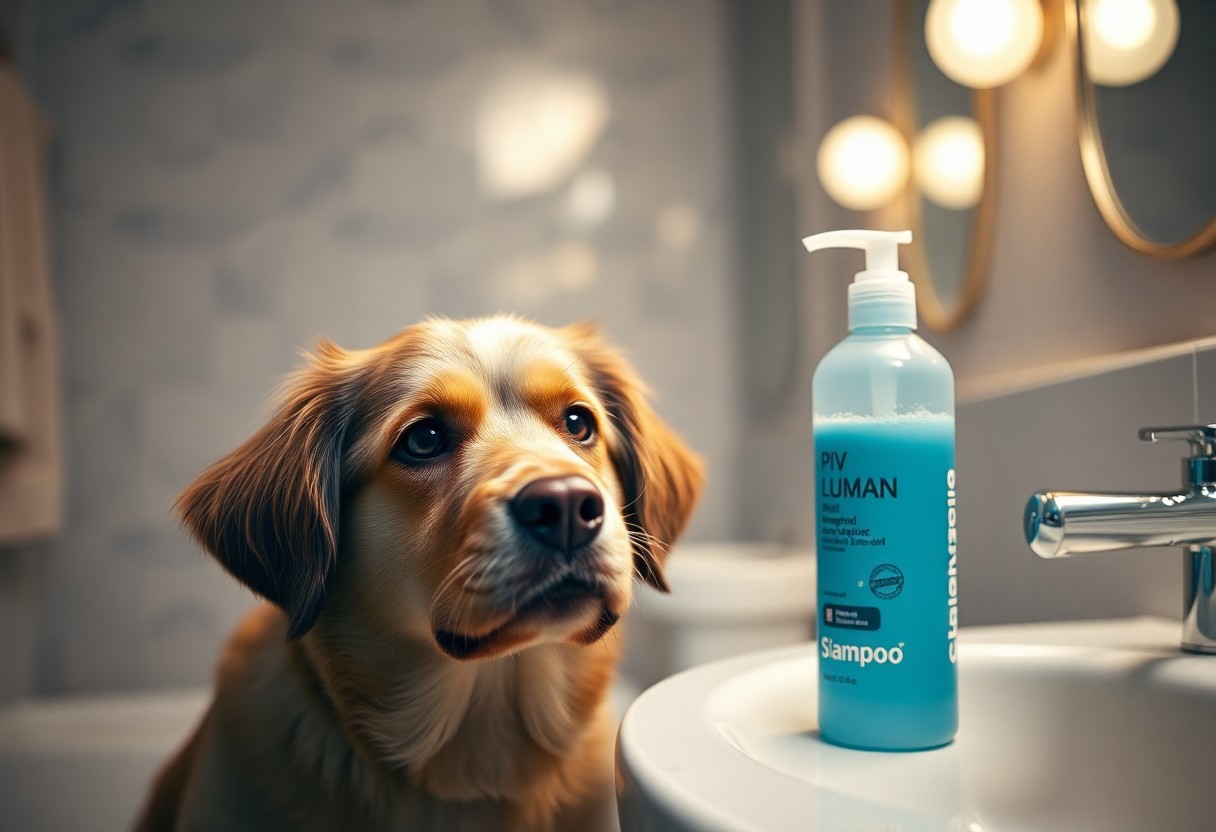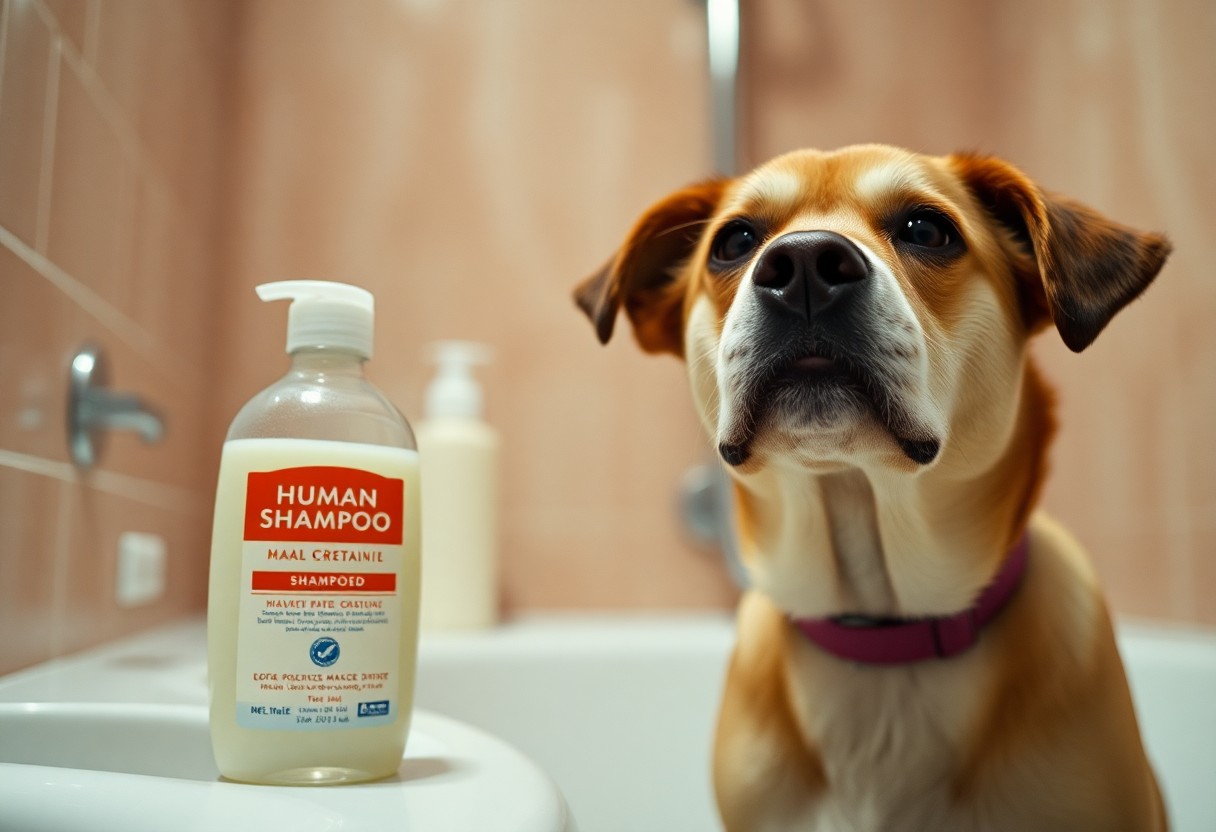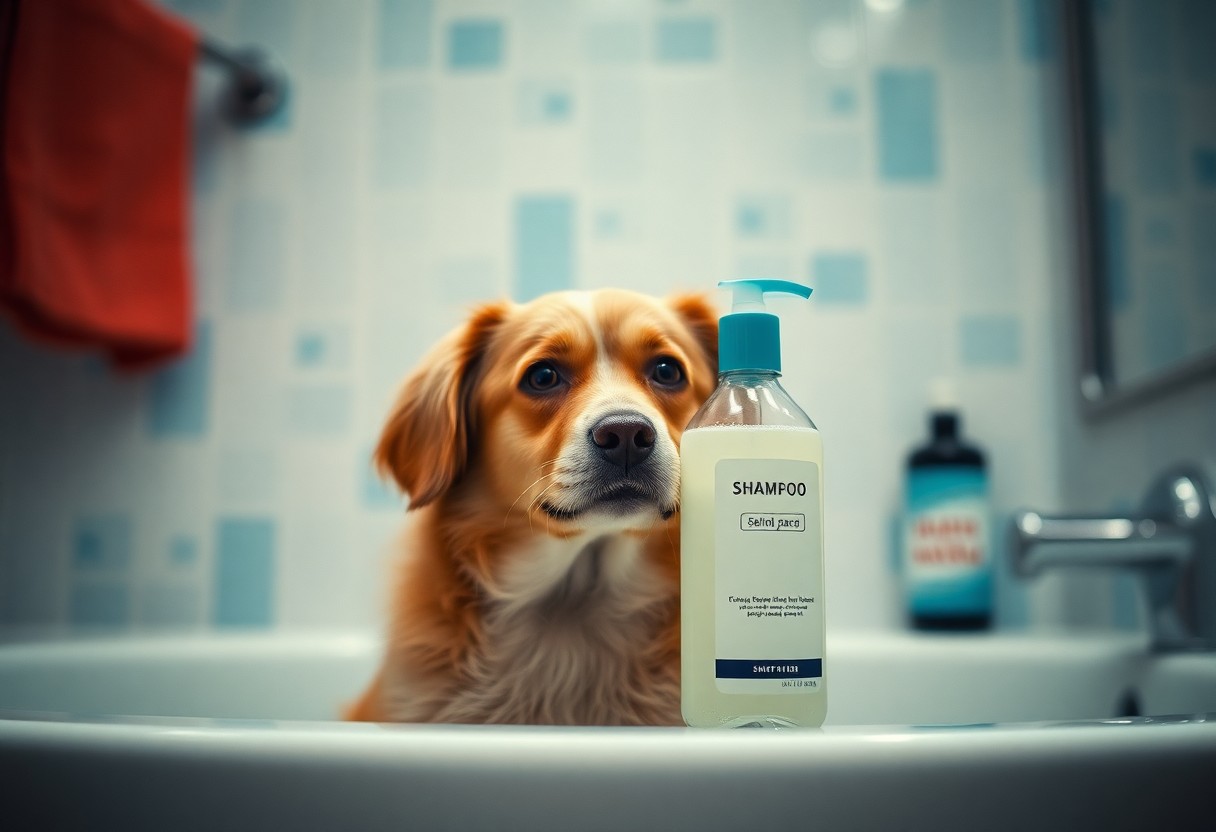Human shampoo is designed specifically for the pH balance and skin sensitivity of people, which differs significantly from your dog’s needs. Using human shampoo on your dog can disrupt their skin’s natural oils, potentially causing dryness, irritation, or allergic reactions. To ensure your pet’s coat remains healthy and shiny, it’s important you choose a shampoo formulated for dogs that considers their unique skin properties. This guide will help you understand why dog-specific shampoos are recommended and what ingredients to look for when selecting the best product for your furry friend.

Key Takeaways:
- Human shampoos often contain ingredients like fragrances, dyes, and chemicals that can irritate a dog’s skin and disrupt their natural pH balance.
- Dogs have a different skin pH than humans, so it’s best to use shampoos specifically formulated for dogs to maintain their skin health and coat condition.
- If you don’t have dog shampoo available, it’s safer to use plain water or consult a veterinarian rather than using human shampoo on your dog.
The Chemical Composition of Human Shampoo
You’ll find that human shampoos combine a variety of chemicals meant to cleanse, condition, and scent hair, tailored specifically for the properties of human scalp and hair. Different from dog shampoos, their formulations usually focus on managing oiliness, dandruff, or scalp health with ingredients that work well at a pH around 5.5. While these chemicals maintain healthy hair for people, their interaction with a dog’s more alkaline skin environment (pH 6.2 to 7.4) can lead to itching, dryness, or allergic reactions, making the chemistry behind these products vital to understand before using them on pets.
Key Ingredients and Their Functions
Most human shampoos contain surfactants like sodium lauryl sulfate to break down oils and dirt, moisturizers such as glycerin to hydrate hair, and conditioning agents like silicone derivatives to smooth strands. Other elements include fragrances for pleasant scents and preservatives like parabens to prevent microbial growth. For individuals targeting dandruff or scalp issues, ingredients like zinc pyrithione or salicylic acid reduce flakes and inflammation. These components are selected to support human hair’s texture, scalp oil balance, and hygiene but aren’t designed with canine skin sensitivity in mind.
Potential Irritants for Dogs
Fragrances, dyes, and certain preservatives in human shampoos often pose irritation risks to dogs. Ingredients like sodium lauryl sulfate can strip oils from your dog’s skin, leading to dryness and itching. Artificial fragrances may trigger allergic reactions, while added dyes can exacerbate sensitivities. High concentrations of chemical additives intended for human use tend to disrupt the delicate lipid layer on a dog’s coat, increasing vulnerability to bacterial or fungal infections. These irritants underline why formulations created specifically for canine skin are generally safer and more effective.
Delving deeper into specific irritants, sodium lauryl sulfate, a strong detergent, can cause severe dryness or dermatitis in dogs, as their skin lacks the protective oils humans have. Fragrances often contain synthetic chemicals known to provoke allergic responses or respiratory issues in sensitive animals. Parabens and other preservatives may interfere with the natural microbiome of canine skin, undermining its immunity. Even seemingly mild dyes and colorants carry risks, as they aren’t tested for canine tolerance. The cumulative effect of these ingredients often results in uncomfortable skin conditions that veterinarians frequently address in pets exposed to inappropriate grooming products.

Skin pH Differences: How They Affect Shampoo Choices
The pH balance of your dog’s skin plays a significant role in determining the most suitable shampoo. Dogs typically have a skin pH ranging from 6.2 to 7.4, which leans toward neutral to slightly acidic, whereas human skin tends to sit around 5.5, more acidic. Using shampoos formulated for human skin can disrupt this balance, leading to irritation, dryness, or increased susceptibility to infections. If you find yourself wondering, I don’t have pet shampoo, what kind of human shampoo should I use on my dog?, consider these pH differences before choosing.
Understanding Canine Skin pH
Canine skin maintains a pH close to neutral, generally between 6.2 and 7.4, which differs from human skin’s pH of about 5.5. This higher pH in dogs supports their unique skin microbiome and natural oils that protect fur and skin health. When you select a shampoo, it should match their skin’s pH to avoid stripping imperative oils or altering their protective barrier, potentially causing dryness or irritation.
The Role of pH in Shampoo Efficacy
Shampoos work best when their pH aligns with that of the skin they cleanse. For dogs, shampoos designed around a pH of 6.5 to 7.5 preserve their skin’s integrity, promoting healthy oils and microbial balance. Human shampoos, typically acidic, can disrupt this balance, resulting in irritation or even flare-ups of skin conditions.
Proper pH balance ensures that the shampoo cleans effectively without being too harsh. An incorrect pH can weaken the skin’s acid mantle, leaving it more vulnerable to infections and allergens. In contrast, pH-appropriate shampoos help maintain the protective oil layer, reducing moisture loss and soothing sensitive skin. Over time, using shampoo with the wrong pH may lead to chronic dryness, itchiness, or seborrhea, emphasizing the importance of selecting products tailored to canine skin chemistry.

The Consequences of Using Human Shampoo on Dogs
Your dog’s skin has a different pH level than yours, so using human shampoo can disrupt the natural oils that protect their coat and skin. This imbalance often leads to dryness, itching, and irritation. Additionally, ingredients like fragrances and harsh detergents common in human shampoos may cause allergic reactions or exacerbate existing skin conditions. For more insight into the risks, check out this detailed guide on Can You Use Human Shampoo on Dogs?.
Short-Term Effects on Dog’s Skin and Coat
In the immediate aftermath of using human shampoo on your dog, you might notice dryness, redness, or flaking of the skin. The coat can lose its natural luster and feel rough or brittle due to stripped natural oils. Dogs may also scratch more frequently due to irritation, which can lead to further skin damage or infection if left untreated.
Long-Term Health Risks
Repeated use of human shampoo can cause persistent skin conditions like dermatitis, chronic dryness, and increased susceptibility to bacterial or fungal infections. The disrupted skin barrier makes it harder for your dog to retain moisture and defend against environmental irritants.
Over time, this stress on the skin can develop into chronic inflammation that may require veterinary treatment. Long-term exposure to unsuitable grooming products could even contribute to systemic issues, as severe skin problems impact your dog’s overall immune response. Veterinary dermatologists frequently recommend dog-specific shampoos to avoid these complications and maintain skin health.
Alternatives to Human Shampoo: Dog-Safe Options
Several dog-specific shampoos cater to various skin sensitivities and coat types, offering gentle cleansing without stripping natural oils. Many formulations include soothing agents like oatmeal or aloe vera, which help alleviate itching or dryness often aggravated by human shampoos. Opting for a shampoo designed for pets ensures the pH balance, typically between 6.2 and 7.4, aligns better with your dog’s skin, reducing the risk of irritation or allergic reactions while maintaining a healthy, shiny coat.
Natural Ingredients to Look For
Ingredients like colloidal oatmeal, chamomile, coconut oil, and aloe vera offer calming and moisturizing benefits while cleansing your dog’s fur. Avoid harsh sulfates and artificial fragrances, which can exacerbate skin sensitivities. Products enriched with vitamins E and B5 contribute to skin healing and coat conditioning, helping to maintain a healthy barrier function. These natural compounds support both sensitive and regular skin, providing a balanced approach to grooming without unnecessary chemicals.
Recommended Brands and Products
Brands such as Earthbath, Burt’s Bees for Dogs, and Vet’s Best offer shampoos formulated specifically for canine skin and coat needs. Products like Earthbath Oatmeal & Aloe Shampoo combine natural soothing ingredients with free-from-harsh-chemicals formulations. Burt’s Bees features hypoallergenic oat and honey formulas, suitable for sensitive skin. Vet’s Best utilizes botanical blends proven in clinical use to support skin health and tackle common issues like dryness and itching.
Earthbath’s Oatmeal & Aloe Shampoo earns high marks for its biodegradable, soap-free formulation that restores moisture and defends against allergens. Burt’s Bees employs USDA-certified natural ingredients, enhancing safety for frequent use. Vet’s Best taps into tea tree and aloe to provide antiseptic and anti-inflammatory benefits without synthetic additives, making it a favorite among pet owners managing mild skin conditions. These brands’ transparency in ingredient sourcing and rigorous testing offer you reliable choices tailored to your dog’s unique grooming needs.
Expert Opinions: Veterinarians Weigh In
Veterinarians consistently advise against using human shampoo on dogs due to the distinct pH balance of canine skin, which ranges from 6.2 to 7.4, unlike human skin’s 5.5. This difference can lead to irritation or dryness if human products are applied. Experts also highlight that some ingredients safe for humans, like fragrances and certain chemicals, may trigger allergic reactions in dogs. Many vets recommend specialized shampoos formulated for dogs’ unique needs to maintain coat health and prevent dermatological issues. For a detailed discussion, you can visit Can I use my shampoo on my dog?.
Studies and Findings on Pet Grooming
Research shows that regular use of human shampoo can strip necessary oils from a dog’s coat, leading to dryness and increased risk of infections. One study found that dogs bathed with species-appropriate formulations had significantly less skin inflammation and improved coat condition over time. These findings reinforce why many grooming experts stress the importance of choosing pH-balanced shampoos developed specifically for pets rather than repurposing human products.
Professional Recommendations for Pet Owners
Professional groomers often recommend selecting shampoos designed to match your dog’s skin type and coat condition, especially products enriched with oatmeal or aloe vera for sensitive skin. Dermatitis-prone dogs benefit from hypoallergenic formulations free from dyes and fragrances, reducing flare-ups and discomfort. Experts also suggest avoiding shampoos with harsh detergents like sodium lauryl sulfate, which can exacerbate irritation.
Expanding on these guidelines, groomers typically advise patch testing any new product on a small area to observe your dog’s reaction before full use. They also emphasize the importance of rinsing thoroughly after shampooing to prevent residue buildup. Following these steps protects your dog’s skin barrier and supports healthy fur growth, underscoring why human shampoos are often a risky choice compared to carefully formulated pet shampoos.
1. Human shampoo pH differs from dogs’ skin pH.
2. Dog shampoos are formulated for sensitive canine skin.
3. Human shampoo may dry and irritate your dog’s skin.
4. Some ingredients in human shampoo can be harmful to dogs.
5. Use pet-specific shampoo to maintain healthy dog coat.
6. Consult a vet before using any new shampoo on pets.
Final Words
Summing up, while it might be tempting to use your human shampoo on your dog, it’s best to avoid it. Human shampoos often contain ingredients that can disrupt your dog’s skin balance and cause irritation. You want to ensure your furry friend’s coat stays healthy and comfortable, so using a shampoo formulated specifically for dogs is the safer choice. This way, you are giving your pet the gentle care they need without risking their skin’s natural protection.
FAQ
Q: Can I use human shampoo to wash my dog?
A: It is generally not recommended to use human shampoo on dogs because their skin has a different pH balance than human skin. Human shampoos can be too harsh, potentially causing dryness, irritation, or allergic reactions in dogs.
Q: What are the differences between dog shampoo and human shampoo?
A: Dog shampoos are specifically formulated to match the pH level of a dog’s skin, which is typically more alkaline compared to humans. They also often contain ingredients that help with common canine skin concerns such as fleas, ticks, or dry coats. Human shampoos may contain fragrances, chemicals, or moisturizers that could be harmful or irritating to dogs.
Q: If I accidentally use human shampoo on my dog, what should I do?
A: If you accidentally use human shampoo on your dog, rinse your dog thoroughly with warm water to remove as much of the shampoo as possible. Monitor your dog for any signs of skin irritation, itching, or discomfort. If you notice any adverse reactions, consult your veterinarian for advice and treatment options.
 wagwagtail "only love can make your dog wag her tail"
wagwagtail "only love can make your dog wag her tail"
